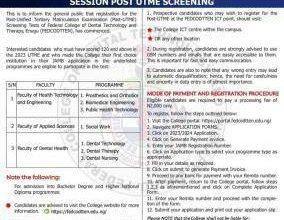
10 Factors Affecting Curriculum Development In Nigeria
Factors Affecting Curriculum Development In Nigeria – Curriculum development in Nigeria is a complex process that is influenced by a variety of factors. These factors include political, economic, social, and cultural considerations.InformationGuideNigeria
Political factors, such as government policies and changes in leadership, can have a significant impact on the direction and content of the curriculum. Economic factors, such as funding and resource availability, can also affect curriculum development.
👉 Relocate to Canada Today!
Live, Study and Work in Canada. No Payment is Required! Hurry Now click here to Apply >> Immigrate to CanadaSocial and cultural factors, such as societal values and beliefs, can also play a role in determining what is included in the curriculum. Additionally, the needs and perspectives of different stakeholders, such as teachers, students, and parents, must be taken into account during the curriculum development process.
Read Also: 10 Factors Affecting National Development In Nigeria
What is Curriculum Development?
Curriculum development is the process of creating and designing an educational curriculum, including the selection of goals, objectives, and content for a course or program of study. This process involves a variety of stakeholders, including teachers, administrators, subject matter experts, and representatives from government and community organizations. The goal of curriculum development is to create a curriculum that is relevant, effective, and responsive to the needs of students and the broader community.
Types of Curriculum Development in Nigeria
There are several types of curriculum development in Nigeria, including:
- Prescriptive Curriculum Development: This type of curriculum development involves outlining specific objectives, content, and methods for teaching. It is often used in formal educational settings and is closely aligned with national educational policies.200 Romantic Love Message
- Behavioral Curriculum Development: This approach focuses on the development of specific skills and behaviors in students. It is often used in vocational and technical education programs.
- Child-centered Curriculum Development: This approach focuses on the needs and interests of the individual child, rather than a predetermined set of objectives or content. It is often used in early childhood education programs.JAMB Portal
- Problem-based Curriculum Development: This approach uses real-world problems or scenarios as a starting point for learning. It is often used in STEM (science, technology, engineering, and mathematics) education programs.
- Integrated Curriculum Development: This approach involves the integration of multiple subjects or topics into a cohesive and meaningful curriculum. It is often used in cross-disciplinary education programs.
Read Also: 10 Factors Affecting National Security in Nigeria
Advantages of Curriculum Development in Nigeria
- Improved Educational Outcomes: Curriculum development ensures that students are exposed to a well-structured and comprehensive program of study that is designed to meet their learning needs and improve their academic performance.10 Economic Challenges In Nigeria
- Economic Development: A well-designed curriculum can contribute to economic development by providing students with the skills and knowledge needed to succeed in the workforce.
- Encourages Critical Thinking: Curriculum development can encourage critical thinking and problem-solving skills, which are valuable in both academic and professional settings.
- Improved Teacher Training: Curriculum development can improve teacher training by providing clear guidelines for instruction and assessment. This can lead to more effective teaching and better student outcomes.NYSC Portal
- Flexibility: Curriculum development in Nigeria can be flexible, allowing for the incorporation of new technologies and teaching methods, as well as the inclusion of diverse perspectives and voices.
Read Also: 10 Factors Affecting National Unity In Nigeria
Curriculum Development and the Nigeria Society
Curriculum development and Nigerian society are complex and multifaceted. One key factor is the influence of colonialism, which brought Western education to Nigeria in the late 19th century. This education was primarily aimed at producing a Westernized elite who could serve as intermediaries between the colonial government and the general population. As a result, the curriculum was heavily focused on Western subjects, such as mathematics, science, and literature, and often ignored the cultural and linguistic heritage of the Nigerian people.15 Best Industries in Nigeria
Another important factor is the political and economic instability that has plagued Nigeria since its independence in 1960. This has led to a lack of consistent funding and support for education, resulting in inadequate resources and a lack of qualified teachers. Additionally, there have been numerous changes in government and educational policies, which have led to a lack of continuity in curriculum development.
👉 Relocate to Canada Today!
Live, Study and Work in Canada. No Payment is Required! Hurry Now click here to Apply >> Immigrate to CanadaFinally, ethnic and religious differences have also played a role in shaping the curriculum in Nigeria. These differences have often led to conflicts and tensions, which have hindered the development of a cohesive national curriculum.
Read Also: 10 Factors Affecting Leadership in Nigeria
Factors Affecting Curriculum Development in Nigeria
Below are some of the factors affecting curriculum development in Nigeria.
- Government Policies and Regulations– The government sets the guidelines and regulations for curriculum development in Nigeria, which may include the inclusion of certain subjects, standards for educational materials, and other requirements.
- Socio-economic Factors– The country’s economic situation and cultural values may influence the curriculum, such as the inclusion of certain subjects that align with the country’s economic goals or the emphasis on certain values or traditions.
- Political Factors– Political considerations may also play a role in curriculum development, such as the inclusion of certain subjects that align with the government’s political agenda or the exclusion of certain subjects that may be seen as controversial or divisive.105 Good Morning Love Messages
- Technological Advancements– The incorporation of technology in the classroom and the integration of digital resources into the curriculum are becoming increasingly important factors in curriculum development.
- Teacher Input– Teachers often play a key role in the development and implementation of curriculum, and their input and feedback can be important factors in determining the content and structure of the curriculum.
- Student Needs and Interests– The curriculum should be tailored to meet the needs and interests of students, providing them with the knowledge and skills they need to succeed in their future careers and lives.
- International Standards and Trends– The curriculum should also be aligned with international standards and trends in education, to ensure that students are prepared for the global workforce and to compete with their peers in other countries.
- Funding– The availability of funding can also play a role in curriculum development, as it can affect the resources and materials that are available for use in the classroom.
- Research-based Practices– Curriculum development should be based on research-based practices to ensure that the curriculum is effective and addresses the current educational needs.
- Evaluation and Assessment– Regular evaluation and assessment of the curriculum is essential for determining its effectiveness and making necessary adjustments or revisions
Read Also: 10 Factors Affecting Nationalism and Patriotism in Nigeria
Conclusion
The factors affecting curriculum development in Nigeria include political and cultural influences, lack of funding and resources, and inadequate teacher training. To improve the education system in Nigeria, addressing these issues is crucial, including providing sufficient resources and training for teachers, and ensuring that the curriculum is free from political and cultural bias. Additionally, involving educators and stakeholders in the curriculum development process can lead to a more effective and relevant curriculum for Nigerian students.
Check JAMB Result
Check and Confirm: How much is Dollar to Naira








